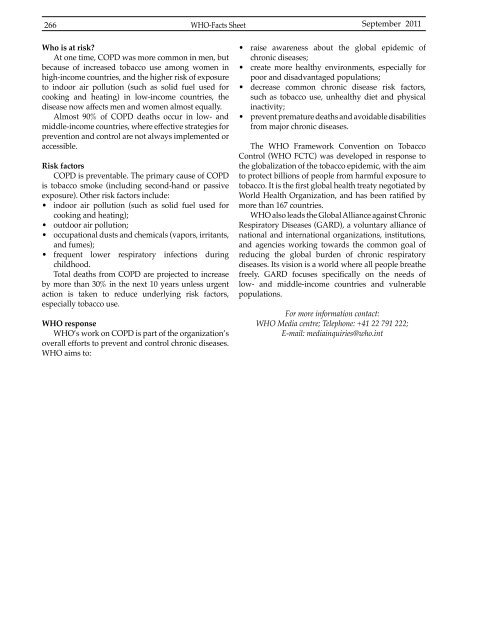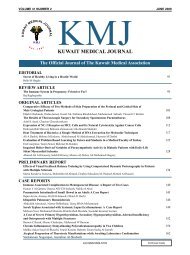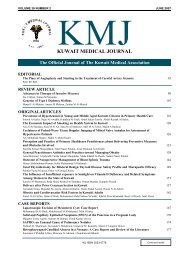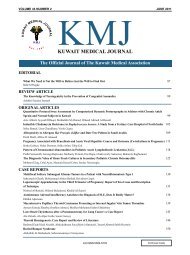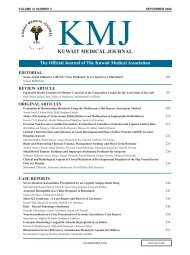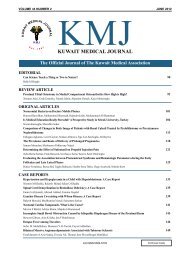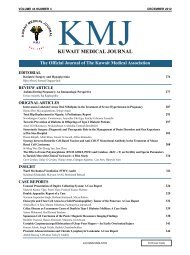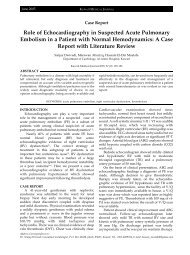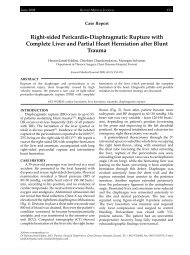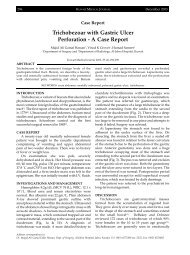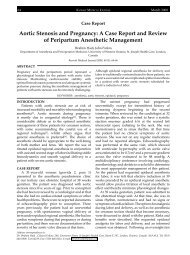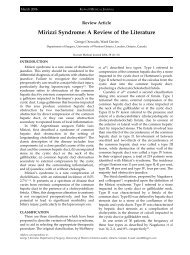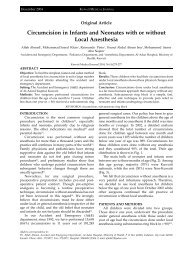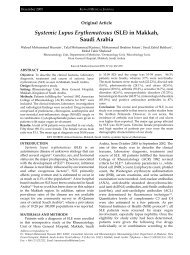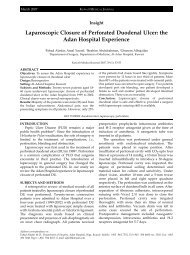Vol 43 # 3 September 2011 - Kma.org.kw
Vol 43 # 3 September 2011 - Kma.org.kw
Vol 43 # 3 September 2011 - Kma.org.kw
Create successful ePaper yourself
Turn your PDF publications into a flip-book with our unique Google optimized e-Paper software.
266<br />
WHO-Facts Sheet <strong>September</strong> <strong>2011</strong><br />
Who is at risk?<br />
At one time, COPD was more common in men, but<br />
because of increased tobacco use among women in<br />
high-income countries, and the higher risk of exposure<br />
to indoor air pollution (such as solid fuel used for<br />
cooking and heating) in low-income countries, the<br />
disease now affects men and women almost equally.<br />
Almost 90% of COPD deaths occur in low- and<br />
middle-income countries, where effective strategies for<br />
prevention and control are not always implemented or<br />
accessible.<br />
Risk factors<br />
COPD is preventable. The primary cause of COPD<br />
is tobacco smoke (including second-hand or passive<br />
exposure). Other risk factors include:<br />
• indoor air pollution (such as solid fuel used for<br />
cooking and heating);<br />
• outdoor air pollution;<br />
• occupational dusts and chemicals (vapors, irritants,<br />
and fumes);<br />
• frequent lower respiratory infections during<br />
childhood.<br />
Total deaths from COPD are projected to increase<br />
by more than 30% in the next 10 years unless urgent<br />
action is taken to reduce underlying risk factors,<br />
especially tobacco use.<br />
WHO response<br />
WHO’s work on COPD is part of the <strong>org</strong>anization’s<br />
overall efforts to prevent and control chronic diseases.<br />
WHO aims to:<br />
• raise awareness about the global epidemic of<br />
chronic diseases;<br />
• create more healthy environments, especially for<br />
poor and disadvantaged populations;<br />
• decrease common chronic disease risk factors,<br />
such as tobacco use, unhealthy diet and physical<br />
inactivity;<br />
• prevent premature deaths and avoidable disabilities<br />
from major chronic diseases.<br />
The WHO Framework Convention on Tobacco<br />
Control (WHO FCTC) was developed in response to<br />
the globalization of the tobacco epidemic, with the aim<br />
to protect billions of people from harmful exposure to<br />
tobacco. It is the first global health treaty negotiated by<br />
World Health Organization, and has been ratified by<br />
more than 167 countries.<br />
WHO also leads the Global Alliance against Chronic<br />
Respiratory Diseases (GARD), a voluntary alliance of<br />
national and international <strong>org</strong>anizations, institutions,<br />
and agencies working towards the common goal of<br />
reducing the global burden of chronic respiratory<br />
diseases. Its vision is a world where all people breathe<br />
freely. GARD focuses specifically on the needs of<br />
low- and middle-income countries and vulnerable<br />
populations.<br />
For more information contact:<br />
WHO Media centre; Telephone: +41 22 791 222;<br />
E-mail: mediainquiries@who.int


